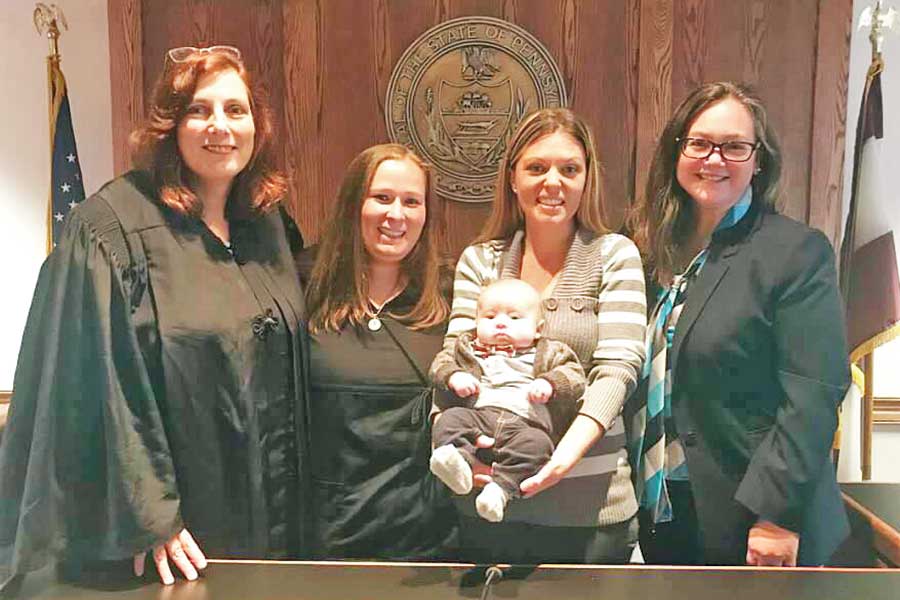
I spent nearly 33 years of my life as a non-parent. It was just part of my identity — something that subtly guided how I moved through the world but that I rarely thought twice about, like my LGBT orientation, my right-handedness or my reliance on contact lenses. In an actual instant, though, that status changed and I was now a parent.
Everyone talks about the “love-at-first-sight” feeling you have the first time you lay eyes on your child, and that certainly abounded as the doctors passed Jackson to me and Ashlee in the operating room. Getting used to actually being his parent, however, has been anything but instantaneous.
The first few days after Jackson was born, Ashlee and I were in an adrenaline- and caffeine-filled daze, going through the motions: Feed the baby, try to rock him to sleep, change the baby, try to rock him to sleep, feed the baby … The pace of the merry-go-round never slowed down, which I think made reality seem even harder to keep up with. Here was this little invader into our lives, whose belongings seemed to have shown up all over every inch of our house and whose lack of any semblance of a schedule had thrown our own very regimented schedules into disarray. We both felt like we were living in someone else’s lives because ours suddenly looked so different.
All of that stemmed from the fact that we were now parents, but this new — and most important — aspect of our identities just seemed out of place for a while. It wasn’t until we started understanding Jackson’s seemingly nonsensical little self and building somewhat of a routine into the chaos that we were able to slow down that dizzying merry-go-round just a tiny bit. From there, we began to actually appreciate the kaleidoscope of moments that we were building, each of which helped us grow into our own confidence and start to actually think of and see ourselves as parents.
In the beginning, Jackson was largely a screaming, pooping timebomb; it was hard to imagine him realistically as anything but. The more time I spent with him and got to differentiate this cry from that cry, glean his favorite positions in which to lie or even predict when a diaper change was needed, he began to change in my eyes. This hit me when Ashlee and I settled in to watch “Life of the Party” — the Melissa McCarthy comedy about the relationship between a mom and her college-aged daughter. Holy crap, Jackson’s going to go off to college one day, I thought, surprising myself with that less-than-obvious — but still jarring — realization.
I’ve continued to see the future differently, moment by moment. After Jackson succeeded at going to the bathroom after a particularly challenging struggle — through which Ashlee and I goofily encouraged him, clapping when he succeeded — I ridiculously flashed forward in my mind to the pride I’m going to feel at all of his accomplishments years down the line. When I had to pull on the snaps of one of his preemie onesies to get it to close, I was struck by how quickly he was growing — and by how emotional that made me.
The worry has also come moment by moment. Right after Jackson was born and we were still in the hospital, all Ashlee and I wanted to do was pull the covers over our heads and sleep. After he settled in at home, we’ve both crept out of bed countless times to bend over him and make sure he’s still breathing. When he was a few weeks old, on the way home from a doctor’s appointment, we pulled the car over to the side of the road when the backseat mirror slipped down a bit and we could no longer see his face — and of course illogically presumed he had stopped breathing. The first time he ran a slight fever of 99 degrees, we both cried. I was hit with tears one day when a commercial for Shriners Hospitals for Children came on. I realized how lucky we are that our little guy is healthy. And again, another time when he spit up through his nose and lapsed into a blood-curdling scream of pain. Little by little and moment by moment, our emotions have become intrinsically intertwined with his.
The more comfortable I’ve become with my identity as a parent, the more I see how skewed my own perception of my “future” parental self had been. This was painfully clear when he got his two-month vaccinations. Since Ashlee works in the medical field and is often the one delivering infant shots, she warned me how emotional parents can get. Pshhh, I thought — it’s fine. He cries all the time; I’m used to it. I was quite wrong. I tried soothing him on my lap when he started screaming in pain, but lost it myself when he turned his tear-filled little eyes toward me.
I also scoffed at the many warnings I heard about how hard the first day of daycare would be; I only had a few days off from work when the baby was born — so I figured I’d be fine with the separation since I did it daily anyway. As we handed Jackson off to the daycare staff, both Ashlee and I welled up in involuntary tears and tried to awkwardly back out of the room. I used to think people who wept openly at cute baby videos on YouTube were ridiculous — as were those who smiled at each baby they passed on the street; I reserved those emotions solely for cute dog videos and passing pups. I recently found myself shedding tears over a video of a soldier meeting his daughter for the first time after deployment, and later ashamedly cooing over my friend’s infant daughter’s cheeks. (I, of course, still do not trust anyone who doesn’t smile at dogs on the street.)
I used to roll my eyes at parents who thought every movement their child made was precious and worthy of extensive documentation; while I still try not to overshare pictures of the baby on social media, I have found myself delighting in each and every milestone he reaches, no matter how seemingly small. He smiled for the first time (voluntarily!) on Oct. 12, sending Ashlee and I into a tizzy; that paled in comparison to his first laugh on Thanksgiving. We both screamed so loudly in joy that we scared him and he’ll probably never laugh again.
This gradual easing into parent mode has also normalized moments I never would have expected. On Ashlee’s first day back to work after maternity leave, she raced home eager to see Jackson and hear how our days went. She came home to me giving him a bath, during which he decided to go number two on his cloth tub covering. Together we scooped that mess out while she told me all about the ups and downs of her return; a conversation that previously would have occurred over the dinner table with a celebratory bottle of wine had quite a different setting, but by this point, it seemed normal. During Jackson’s first trip to see the Macy’s Christmas light display, he started vomiting during the show and I quickly reached out and caught it in my hand; Ashlee handed me tissues and the show went on. Just the other night, the baby awoke with gas pains and, after rocking him for a few minutes, I lowered him back into his Rock ’n Play, stealthily keeping my hand on his head until he was deeply back asleep. That this 2 a.m. routine seemed perfectly par for the course illustrates to me how much more at ease I’ve gotten with the changes this whole parenting thing has ushered in.
Another big realization came in late October, when we had to head to the Montgomery County Courthouse to make my second-parent adoption of Jackson official; though my name is listed on his birth certificate, experts advise same-sex couples to add another layer of legal protection to ensure the nonbiological parent’s rights are secured. Other families finalizing adoptions before the judge that day were dressed to the nines, snapping pictures alongside tons of family members. We looked sheepishly at one another because, to us, this just felt like some legal mumbo jumbo we had to deal with before we could get on with our day. Signing some extra paperwork was just unavoidable red tape, as we already both had grown accustomed to being Jackson’s parents.
Four months doesn’t seem like a long time, but it’s filled with what feels like millions of moments. For those who have just welcomed a baby, some of those moments are joyful, others terrifying and most are challenging. But all fuse to become building blocks that help parents step into their new identity and face the future with confidence.

